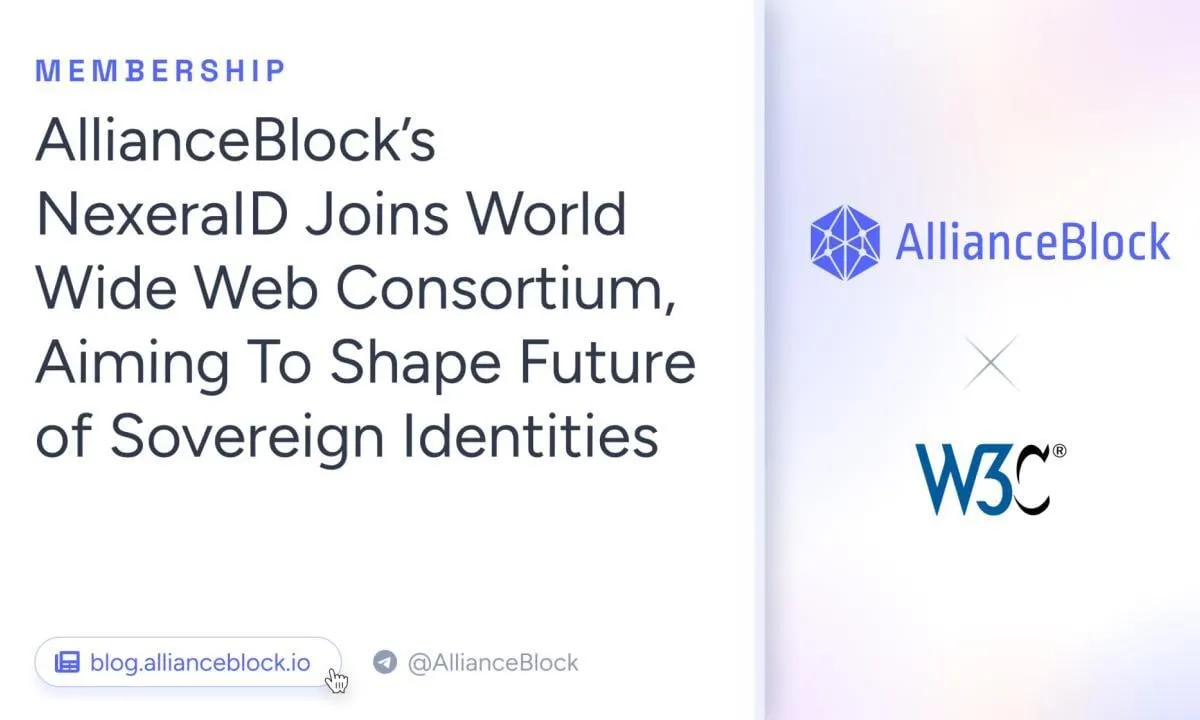Utrecht, Netherlands, May 3rd, 2023, Chainwire
AllianceBlock’s groundbreaking self-sovereign identity issuance and verification solution, NexeraID, has joined the World Wide Web Consortium (W3C), the preeminent international Web standards organization.
NexeraID is a self-sovereign identity issuance and verification platform that empowers companies to seamlessly onboard users to Web3 using self-custodial or custodial wallets. It streamlines complex compliance workflows while safeguarding users’ identities and assets. To this end, the solution already complies with W3C’s established standards for decentralized identifiers (DIDs) and verifiable credentials (VCs).
W3C is a global technical consortium that enables companies, projects, and the public to come together and develop innovative web technologies. W3C is best known for pioneering technical Web technologies like HTML and CSS and is led by world wide Web inventor Tim Berners-Lee. Its members actively contribute to developing fundamental web technologies, establishing a framework for technological ethics, and exchanging ideas with industry and research community experts.
"We are extremely excited to be working with fellow W3C member organizations in the development of interoperable web standards, bringing expertise to help shape the principles of sovereign identity, which can only be done by collaborating with other industry leaders in these fields,” says AllianceBlock Founder and CEO Rachid Ajaja.
W3C has an impressive membership list of 450 global leaders, like Microsoft, Apple, Ethereum Foundation, and Coinbase. NexeraID will proactively collaborate with industry leaders to foster and promote the standardization of Decentralized Identifiers (DID) and Verifiable Credentials (VC) on the Web. NexeraID will benefit from access to a vast network of leading industry players and provide their technical expertise to W3C while collaborating on improving and developing new standards for the digital identity space.
Decentralized Identifiers became an official Web standard last year. They are designed to give users and organizations greater security and privacy by allowing them to establish and manage their digital identities across technological boundaries. Verifiable Credentials, another W3C standard, enable users to offer digitally encrypted and secure evidence during their authentication processes.
The NexeraID technology utilizes a programmable smart wallet to securely store digital assets and identity information and is built on top of the open-source AllianceBlock Nexera Protocol. Enterprises and consumers will both benefit from NexeraID. Enterprise customers can easily expand into Web3 and adopt Web3 with NexeraID solutions. The Web3 smart wallet and self-sovereign identities (SSI) can be integrated into businesses' infrastructures, enabling them to onboard users and validate their compliance with regulatory rules. NexeraID can be easily integrated into enterprise infrastructure, promoting increased user conversion and Web3 adoption. Consumers can create safe and secure smart wallet accounts with NexeraID using their email or social media information, similar to current Web2 practices. Wallets can be managed using biometrics, Apple ID accounts, and Google Accounts. In addition, users can further secure their smart wallets with spending limits and recovery rules.
About the World Wide Web Consortium (W3C)
The mission of the World Wide Web Consortium (W3C) is to lead the Web to its full potential by creating technical standards and guidelines to ensure that the Web remains open, accessible, and interoperable for everyone around the globe. W3C well-known standards HTML and CSS are the foundational technologies upon which websites are built. W3C works on ensuring that all foundational Web technologies meet the needs of civil society, in areas such as accessibility, internationalization, security, and privacy. W3C also provides the standards that undergird the infrastructure for modern businesses leveraging the Web, in areas such as entertainment, communications, digital publishing, and financial services. That work is created in the open, provided for free and under the groundbreaking W3C Patent Policy.
W3C's vision for "One Web" brings together thousands of dedicated technologists representing more than 400 member organizations and dozens of industry sectors. W3C is a public-interest non-profit organization incorporated in the United States of America, led by a Board of Directors and employing a global staff across the globe. For more information see https://www.w3.org/
About AllianceBlock
AllianceBlock is building seamless gateways between decentralized and traditional finance by remedying issues in both spheres and linking them more closely. They see the future of finance as an integrated system where the best of both worlds can work together to increase capital flows and technological innovation.
By bridging traditional finance with compliant, data-driven access to new decentralized markets, DeFi projects, and ecosystem-scaling tools such as funding and interoperability, they are building a next-generation financial infrastructure that aims to provide regulated financial entities worldwide with the tools they need to access the DeFi space seamlessly.
Follow AllianceBlock on Twitter and join the Telegram Community to stay updated on the latest AllianceBlock news and updates.
You can also find AllianceBlock on:
Telegram · Twitter · LinkedIn · Website · Instagram · YouTube · Medium
Contact
Dan Edelstein
pr@marketacross.com
Disclaimer: Press release sponsored by our commercial partners.
